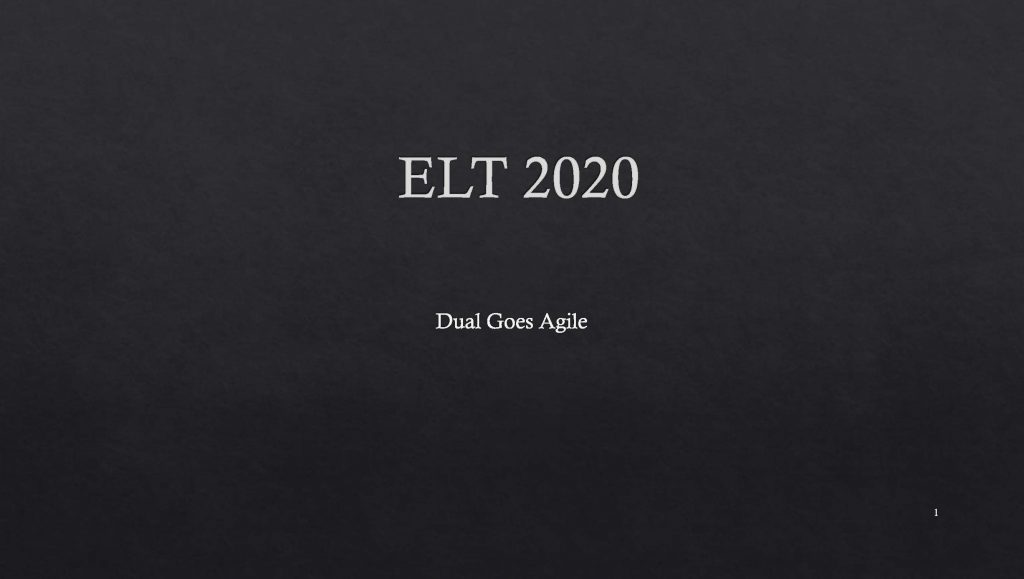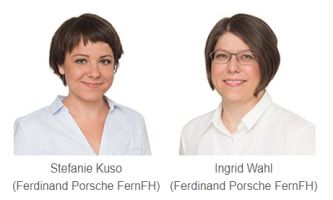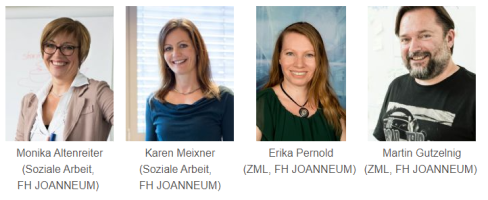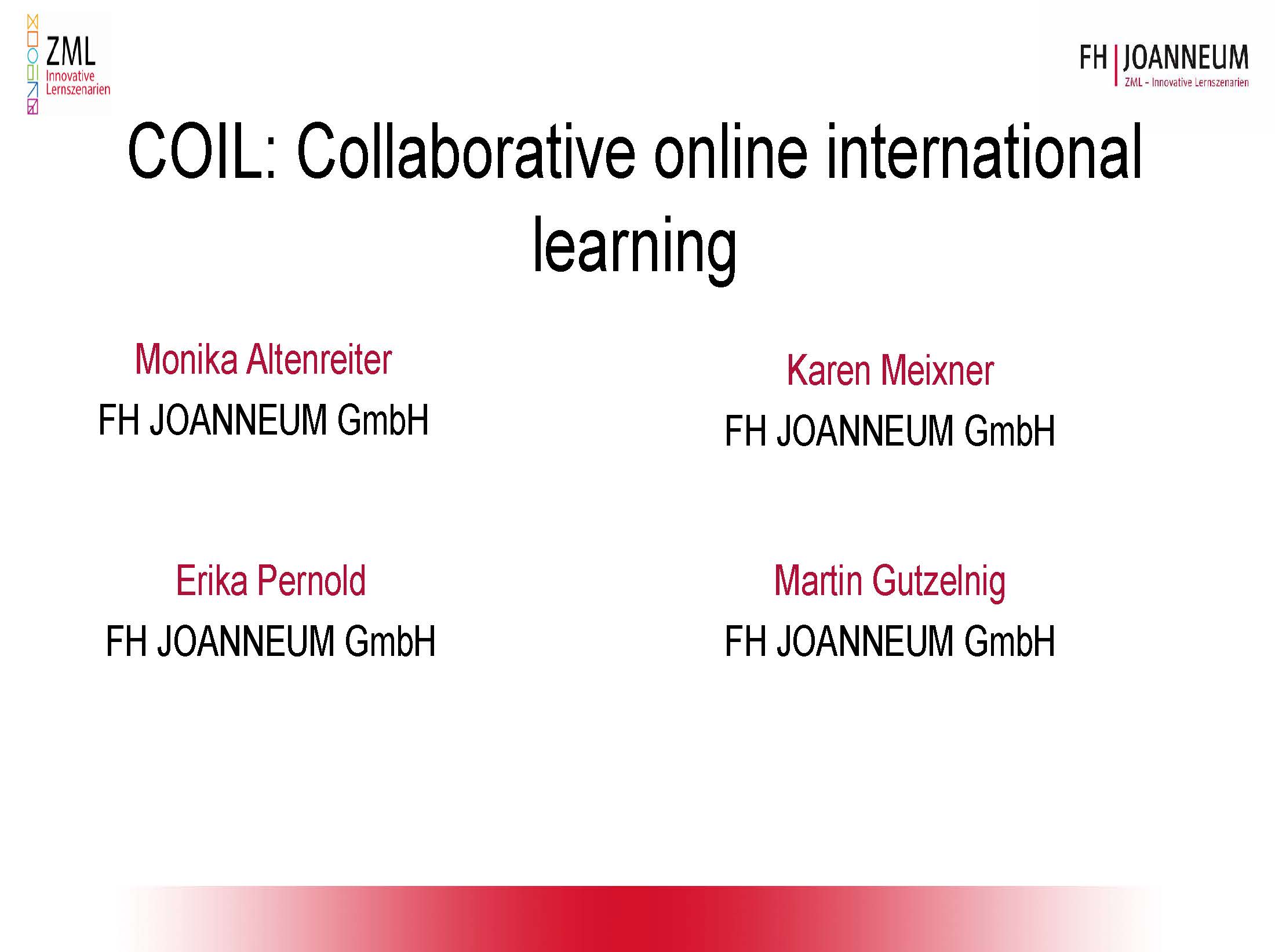Präsentationen
Dual goes Agile


Projekt “Immersives Lernen”

Collaborative online international learning – COIL


Abstracts
Dual goes Agile
Langtitel: Dual goes Agile – teaching our students’ future selves
Referenten und Referentin:
Öffl, Andreas, DI(FH), MSc: Andreas Öffl ist seit 2018 Senior Lecturer an der FH JOANNEUM am Studiengang „Mobile Software Development“.
Ulm, Michael, DI(FH), MA: Michael Ulm ist seit 2017 Hochschullektor an der FH JOANNEUM am Studiengang „Mobile Software Development“ und seit 2012 Geschäftsführer und Inhaber von “mea IT Services”.
Köllinger, Heidemarie, Mag.a: From 2009 until 2018 external lecturer of English for Specific Purposes at the Institute of “Internet Technologies and Applications”. Since 2018 employed at the Department of „Mobile Software Development“.
Krainz, Elmar, Dipl.-Ing. Dr.techn: Elmar Krainz ist seit 2007 an der FH JOANNEUM tätig (Wissenschaftlicher Mitarbeiter, Hauptberuflicher Lehrender), seit 2018 leiter er den Studiengang “Mobile Software Development.
Inhalt:
- Integrating reflective, agile methods of software development in higher education/didactics.
- Improving course quality by speeding up feedback cycles and lowering reaction times.
- Exposing students to real-life-working scenarios through educational environment including agile methods.
From the third semester onwards, students of the degree programme “Mobile Software Development” at FH JOANNEUM work in companies to utilize their acquired theoretical knowledge. As these companies often use agile software development methods, they require “agile mindsets” from their employees. Introducing the agile core concepts of transparency, inspection and adaptation into lectures as part of a blended learning model helps students get into the required mindset as well as iteratively and incrementally improving the quality of the lectures themselves. Students are encouraged to periodically reflect on their learning experience and provide feedback in order to maximize their benefit.
The purpose of the talk is to show how agile methods can be expanded to the field of higher education leading to enhancements in the students’ retention of information, their engagement and output, while at the same time improving the quality of the lectures.
Projekt „Immersives Lernen“
Langtitel: Evaluation des Entwicklungsprozesses immersiver Lernumgebungen
Referentinnen:
Kuso, Stefanie, Mag.a, bakk.a: Stefanie Kuso studierte „Psychologie und Soziologie“ an der Universität Wien. Seit 2017 ist sie wissenschaftliche Mitarbeiterin und Lehrende an der FernFH im Studiengang „Aging Services Management Bachelor“.
Wahl, Ingrid, Prof.in (FH) Mag.a Dr.in: Ingrid Wahl studierte an der Universität Wien „Psychologie“ und promovierte dort im Fachbereich „Wirtschaftspsychologie“. Seit 2012 ist sie wissenschaftliche Mitarbeiterin an der FernFH im Studiengang „Betriebswirtschaft & Wirtschaftspsychologie Bachelor“.
Inhalt:
Darstellung des Designs und der Zwischenergebnisse der formativen Prozessevaluation von Arbeits- und Projektmanagementschritten bei der inhaltlichen und technischen Entwicklung von innovativen Lernumgebungen im Projekt „Immersives Lernen“ mit Fokus auf die Anwendung von agilem Management.
Für die Entwicklung innovativer und technisch umsetzbarer immersiver Lernumgebungen (z. B. VR, AR, 360° Videos) sind dichte Feedbackschleifen zwischen Lehrenden und Projektteam sowie Flexibilität in den Umsetzungsvorstellungen notwendig. Agiles Management kann in solchen dynamischen Arbeitsumwelten gut eingesetzt werden (Brückner & von Anelm, 2016).
In einem vom Land NÖ geförderten Projekt werden immersive Lerninhalte entwickelt und der Erstellungsprozess halbjährlich evaluiert, mit dem Ziel, systematisch über Erfahrungen zu reflektieren und erforderliche Anpassungen rechtzeitig vornehmen zu können. Dazu werden die drei ProjektmitarbeiterInnen halbjährlich, einzeln und mittels offener Leitfadeninterviews befragt.
Nach sechs Monaten zeigte sich agiles Projektmanagement gegenüber traditionellem überlegen, um die Kommunikation im Projekt zu erleichtern und Struktur in das komplexe Arbeitsfeld zu bringen, ohne dabei die kreative Freiheit einzuschränken (Schwaber & Sutherland, 2017).
Collaborative online international learning
Langtitel: COIL: Collaborative online international learning
Referentinnen und Referent:
Altenreiter, Monika, Mag.a phil.: Monika Altenreiter is senior lecturer at the department of social work at University of Applied Sciences FH JOANNEUM. She organizes and coordinates the curriculum module “International Social Work” department.
Meixner, Karen Lorraine, Mag.a, B.A.: Karen Meixner works at the University of Applied Sciences FH JOANNEUM in Graz where she teaches courses within the department of Building, Energy and Society at the Institute of „Social Work“.
Pernold, Erika, Mag.a: Erika Pernold works as a certified e-moderator and supports participants of MOOCs and blended learning scenarios. She also works on the “Virtual Campus” (CML) at FHJ, supporting teachers and students using “Moodle”.
Gutzelnig, Martin Alexander, M.A.: Martin Gutzelnig supports lecturers in the use of “PlagScan” software (helpdesk, training, documentation), which is used for checking degree theses for plagiarism. Since 2013 he has increasingly focused on movie- and videoproduction at CML – Innovative Learning Scenarios.
Inhalt:
Our goal was to implement COIL (Collaborative online international learning) to support the concept of internationalization at home and to promote global knowledge in innovative social work education.
With our contribution we want to show the collaborative work and preparation between the two universities that led to the joint international remote classroom Zoom session. We will discuss the applied methods, both, technological and didactic before presenting the results of the ‘joint international classroom’ firstly from the student perspective (on the basis of anonymous student evaluations completed after the session) and secondly from an educator perspective.
We will emphasize what worked well in practice, where students benefited from this experience and which advantages over a conventional classroom setting were gained due to the technology and methods implemented.